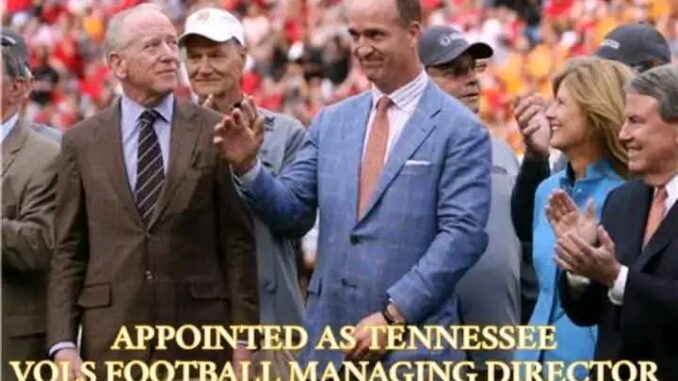
In a groundbreaking decision that’s sending waves through the college sports world, NFL legend and beloved Tennessee alumnus Peyton Manning has been named the new Managing Director of Athletics at the University of Tennessee. This bold leadership move marks a pivotal moment in the university’s athletic history, as Manning’s appointment symbolizes a strong commitment to restoring the university’s reputation for athletic excellence.
Manning, a Hall of Fame quarterback and one of the most iconic figures in NFL history, returns to his alma mater with a wealth of experience, leadership skills, and a deep-rooted passion for the University of Tennessee. His presence is already energizing fans, alumni, and student-athletes alike, with many seeing his return as the beginning of a new chapter for Volunteer athletics—one that could restore the program to national prominence.
Throughout his career, both on and off the field, Manning has been known for his discipline, intelligence, and relentless pursuit of excellence—qualities that now take center stage in his leadership role. While he has no formal experience running a collegiate athletic department, his long-standing involvement in football operations, mentoring roles, and philanthropic efforts gives him a unique perspective that many believe can bring a fresh approach to the university’s athletic strategy.
Manning’s appointment is more than a symbolic gesture—it reflects a strategic shift in how Tennessee plans to rebuild its athletic brand. The university has seen its share of ups and downs in recent years, particularly in its flagship football program, which has struggled with coaching instability, inconsistent results, and dwindling fan enthusiasm. With Manning at the helm, there’s a renewed belief that Tennessee can once again become a powerhouse in the Southeastern Conference (SEC) and on the national stage.
University officials are optimistic that Manning’s leadership can foster a new culture of excellence, accountability, and innovation within the department. He is expected to play a critical role in hiring decisions, fundraising efforts, facility improvements, and the overall vision for Tennessee Athletics moving forward. His connections within the sports world, along with his unmatched credibility among fans and players, could also help attract top-tier talent across multiple sports.
Perhaps most importantly, Manning embodies the Volunteer spirit—he’s a proud alum who has never distanced himself from the program, even during its more challenging years. His return signals a renewed focus on tradition, pride, and unity—values that could help reestablish Tennessee as a respected and competitive force in college sports.
As the university community rallies around this high-profile appointment, the future of Tennessee Athletics looks more promising than it has in years. If Manning can translate his success from the gridiron to the administrative side of college sports, his legacy at the University of Tennessee could grow even larger, not just as a player, but as the architect of a remarkable Volunteer resurgence.
Leave a Reply